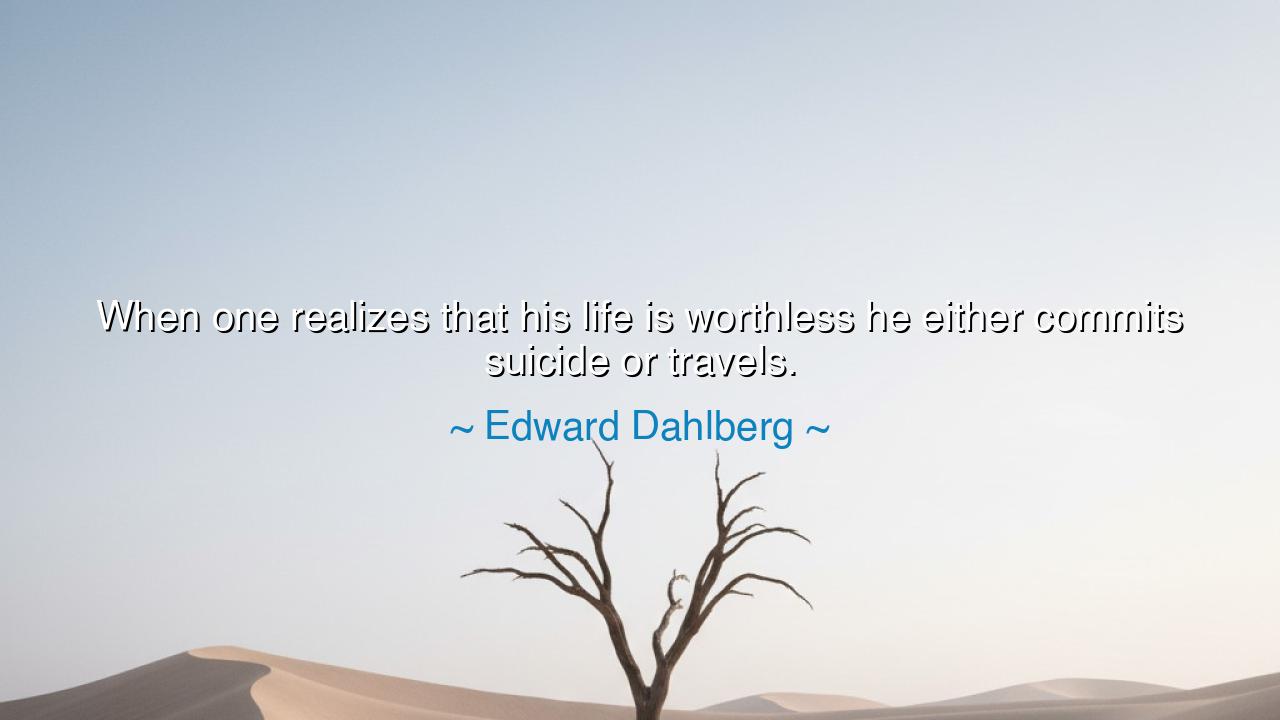
When one realizes that his life is worthless he either commits






The words of Edward Dahlberg, “When one realizes that his life is worthless he either commits suicide or travels,” pierce with the sharpness of despair, yet also with the strange hope of renewal. In them lies the recognition of a deep crisis in the human soul: the moment when one feels empty, unanchored, without purpose. Such moments have always haunted mankind. For some, they lead to destruction; for others, they open the path to transformation. Dahlberg’s words remind us that when life feels hollow, we are faced with a choice—to surrender to nothingness, or to move, to seek, to change the horizon.
To say that life is worthless is to confront the abyss of meaninglessness, a shadow that many encounter. This realization can break a person, for it shakes the very foundation of existence. Yet Dahlberg, in his fierce bluntness, offers an alternative: if death tempts you, then instead travel—leave the familiar, uproot yourself from the stagnant soil, and seek the unknown. For in travel lies discovery, not only of new lands, but of the self. To walk strange roads, to meet unfamiliar faces, to breathe air never breathed before—this is to awaken a spirit numbed by despair.
The ancients themselves understood this choice. In the myths of Homer, Odysseus wanders for years across perilous seas, and though he suffers greatly, each journey reshapes his soul. Travel becomes a sacred ordeal, a way of discovering one’s own endurance and wisdom. Even the philosophers of Greece and India walked from city to city, teaching and learning, for they believed that new landscapes awaken new thoughts. Dahlberg’s words echo this wisdom: when despair whispers that life has no value, the cure is often to step beyond the narrow confines of one’s world and let the wider earth speak.
History gives us powerful examples. Consider Leo Tolstoy, who in his middle years fell into a profound depression, so deep that he confessed thoughts of suicide. Yet instead of ending his life, he traveled inwardly and outwardly—immersing himself in the lives of peasants, wandering roads with pilgrims, seeking truth in simplicity. These journeys transformed him, giving birth to new works and philosophies that inspired generations. His despair might have ended him, but travel—movement of body and soul—became his salvation.
The heart of Dahlberg’s teaching is this: movement is the antidote to despair. To remain still in worthlessness is to wither, but to step outward is to discover that life is larger than the prison of one’s own thoughts. Travel is not merely physical; it is spiritual. One may journey across oceans or simply across the boundary of one’s habits. Each step into the unknown is a defiance against the whisper of death, a declaration that life, though uncertain, may yet reveal sweetness.
The lesson for us is clear: when life feels empty, do not surrender to darkness. Instead, move. Change your environment, seek new paths, meet new people, or learn new ways of seeing the world. Let travel—whether across continents or within your own heart—awaken you to possibilities you had forgotten. The unfamiliar carries the power to re-enchant life, to remind you that existence is vast and full of undiscovered meaning.
Practical actions follow. When despair presses upon you, do not remain in solitude—walk, explore, journey. If you can, travel to a new place, even if only for a short while. If not, seek travel of the mind: read voices from other lands, immerse yourself in other cultures, step beyond the narrow borders of your own perspective. Let curiosity replace despair, for curiosity is the first step toward hope.
Thus Dahlberg’s words endure: “When one realizes that his life is worthless he either commits suicide or travels.” They are harsh, but they are also a call to courage. In them we are reminded that despair is real, but it need not be final. The choice of travel, of movement, of seeking, is the choice of life over death, discovery over defeat. Take these words as a summons: when emptiness threatens you, rise, move, and let the wide world teach you once more the worth of being alive.






AAdministratorAdministrator
Welcome, honored guests. Please leave a comment, we will respond soon